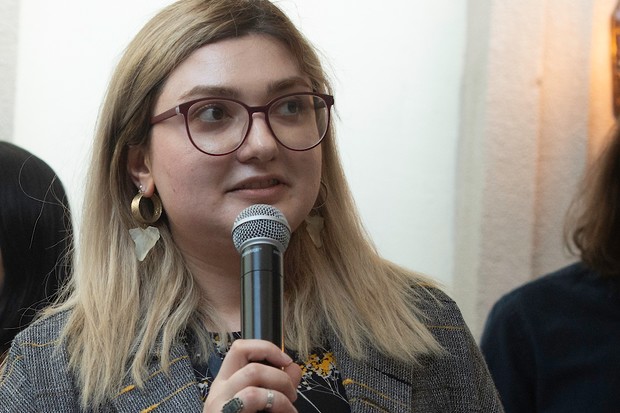Nare Leone Ter-Gabrielyan • Responsabile, GAIFF Pro
"Non si tratta solo di dare opportunità alle nuove generazioni, ma di far capire loro che le stanno perdendo"
di Marta Bałaga
- Abbiamo parlato con il responsabile della piattaforma industry del Golden Apricot International Film Festival dell'edizione appena conclusa

Questo articolo è disponibile in inglese.
The GAIFF Pro Industry Platform at the Golden Apricot International Film Festival, focused on emerging filmmakers from Western Asia, handed out awards to six projects this year. The jury, consisting of Keiko Funato, Ron Dyens and Sigal Yehuda, granted the Grand Prix – and $5,000 – to The Passport by Rakan Mayasi. Special Mention went to Homemade Mulberry Vodka by Anzhela Frangyan. A total of 17 projects participated in the Co-Production Market, originating from Iraq, Palestine, Jordan, Georgia, Iran, and Armenia.
Cineuropa: Your colleagues kept referring to “the pillars” of the event. Is it how you see this structure as well?
Nare Leone Ter-Gabrielyan: This is my first year as the head of GAIFF Pro. The basics my predecessors established remain the same, but it was important to introduce a new approach.
This year, we really focused on workshops and providing space for meetings. We want to combine the idea of the market with residences for the participants, because we understand there aren’t many similar events in the region. We are working with directors developing their first and second films, so the “pillar” idea for this year was to educate and provide new opportunities in terms of networking and pitching.
How important is it to offer monetary awards?
We try to have even more, as it’s so important to give these projects a boost, to show them that there are people who believe in them and their talent, and at the same time offer something concrete. This year, the Grand Prix and the post-production award went to the same project, The Passport, which was very interesting as the juries were different.
You also decided to add a special focus on short films, with Short Cuts Nest [a market for Armenian shorts]. Why is that?
The new wave of Armenian cinema started only a few years ago. It began with this younger generation, but they are not making features just yet. They are exploring new styles and genres, trying to find themselves, and they are doing it through shorts. We want them to have more opportunities. We need it, actually, so that in a couple of years they can start making features.
I talked to several young filmmakers who don’t seem too optimistic about being able to make this jump here in Armenia.
It’s not just about giving opportunities to a younger generation. It’s about changing the mindset and the mentality, and making them understand they are missing them. This year, I was surprised, and not in a good way, that there weren’t many students attending. We are thinking about continuing some initiatives throughout the year, going to universities and high schools, and showing them what the film industry is like. Because it’s not just about watching films. And then, when we provide them with some options, they will be able to grab them.
Another issue is that we still don’t have a proper law on cinema. It’s in the works and it’s taking a bit of time. But in a way, that’s bringing the film community together, as we are trying to figure out how we can navigate this. We have one fund [National Cinema Center of Armenia] and sometimes, it’s just not enough. Also, it’s not just about these commercial films that can be profitable. There is this whole other part, and even international co-productions, that we should pay attention to. We have shorts that are very successful, but I don’t think the general public knows about them. It’s something that should change as well.
What kind of restrictions are in place now, in terms of projects that can apply in the future?
We would like to welcome anyone from Western Asia who really believes in their project. When you look at those that were selected this year, their topics are very, very different. Some of them are at the very beginning of development, others have 80% of their budget in place. I think it comes down to their relevance and quality.
We will continue to concentrate on this region, but I think we can grow in terms of the amount of guests and participants we can invite, and the event itself could actually last longer. We could use some additional time to prep our participants before they start pitching or even do it throughout the year, which would make this educational part of the event much more evident. It’s something we would definitely like to strive towards.
Ti è piaciuto questo articolo? Iscriviti alla nostra newsletter per ricevere altri articoli direttamente nella tua casella di posta.















